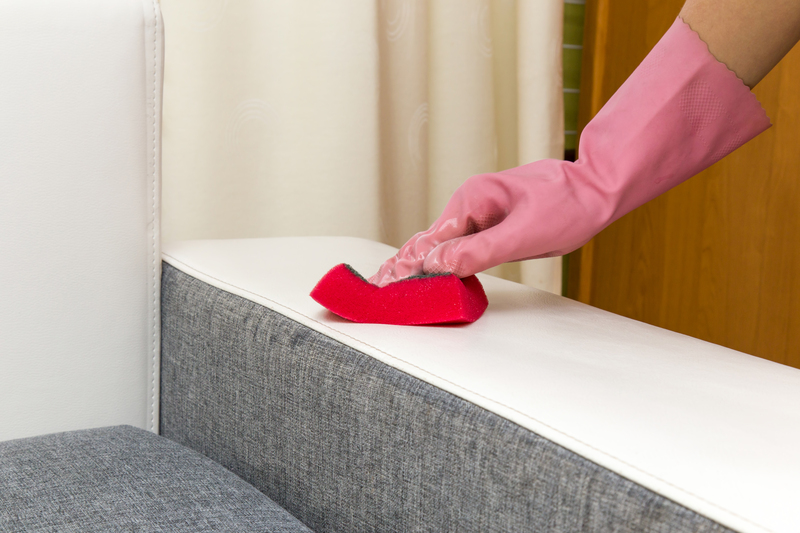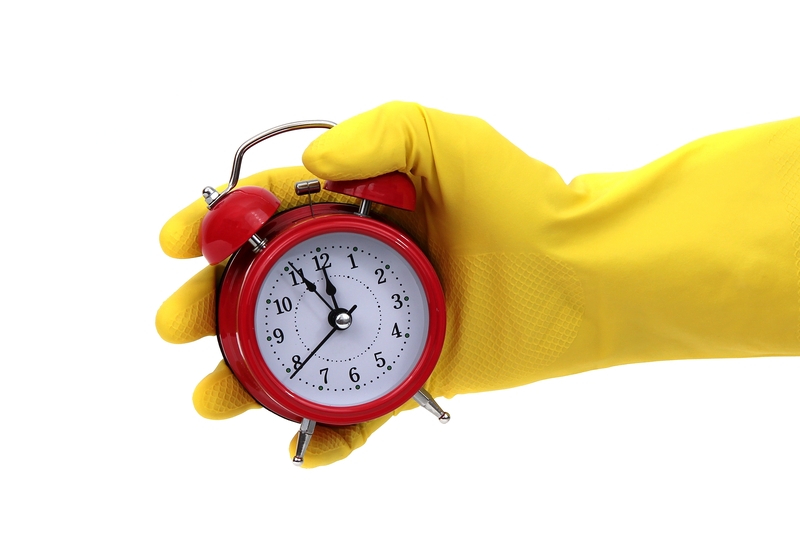Why Air Quality is Essential in Residential and Commercial Zones
Posted on 28/08/2025
Why Air Quality is Essential in Residential and Commercial Zones
Air quality stands as a critical factor in determining the health, comfort, and productivity of people. As urbanization accelerates worldwide, understanding the importance of air quality in residential and commercial zones has never been more urgent. Both home and work environments require clean air not only for legal compliance but also for the well-being of the inhabitants. In this comprehensive guide, we will unravel why maintaining optimal air quality is non-negotiable for any residential or commercial space.

Understanding Air Quality: Definition and Importance
Air quality refers to the degree to which the air in a particular place is clean, clear, and free from pollutants that can cause harm to humans and the environment. Poor air quality can trigger a range of health problems, impact productivity, and degrade building infrastructure.
- Residential air quality affects families, children, and vulnerable individuals the most. It shapes daily life, sleep quality, and overall happiness.
- Commercial air quality impacts employees, customers, and visitors. It's crucial for compliance, productivity, and a company's reputation.
The Science of Air Pollution
There are two main categories of air pollutants:
- Particulate Matter (PM): Fine dust, pollen, smoke, and liquid droplets suspended in the air.
- Gaseous Pollutants: Substances like nitrogen dioxide, sulfur dioxide, volatile organic compounds (VOCs), and carbon monoxide.
These pollutants can arise from many sources: traffic emissions, industrial activities, indoor furnishings, and even household cleaning products. Understanding what taints the air in residential and commercial zones is the first step to combating poor air quality.
The Health Impacts of Poor Air Quality
Short-Term Health Effects
- Eye, nose, and throat irritation
- Headaches, dizziness, and fatigue
- Exacerbation of asthma and respiratory illnesses
Long-Term Health Risks
- Chronic respiratory diseases and lung cancer
- Heart disease and stroke
- Allergic reactions and development of new allergies
The quality of indoor air in homes and workplaces determines the health trajectory of every individual occupying the space. Children, elderly individuals, and people with pre-existing medical conditions are especially vulnerable.
Why Residential Air Quality Must Not Be Ignored
Your home should be a sanctuary, but poor residential air quality can swiftly turn it into a source of health hazards.
- Exposure to bioaerosols like mold spores and pet dander can exacerbate allergies and asthma, especially in children.
- Secondhand smoke and chemical fumes from household products can linger indoors far longer than outside.
- Cooking, heating, and the use of synthetic materials and paints increase the risk of volatile organic compounds (VOCs) accumulating.
Common signs of poor home air quality include frequent colds, eye irritation, persistent cough, and unexplained fatigue. These issues underscore why monitoring the air at home is critical for safeguarding your family's health and comfort.
The Unseen Dangers in Commercial Building Air
In commercial zones--offices, retail centers, and warehouses--the stakes are just as high, if not higher. Here's why:
- Building-related illnesses such as Sick Building Syndrome (SBS) are common, manifesting as headaches, fatigue, and irritation among staff.
- The proliferation of bacteria and viruses in improperly ventilated areas can spike absenteeism and lower productivity.
- Poor ventilation leads to accumulation of toxic gases like carbon dioxide, affecting cognitive function and decision-making.
Addressing commercial indoor air quality isn't just about compliance; it's an investment in employee performance and business reputation.
Economic Benefits of Good Air Quality in Residential and Commercial Zones
- Lower healthcare costs: Long-term exposure to air pollutants increases medical expenses for families and leads to higher health insurance costs for employers.
- Increased productivity: Clean air improves concentration and reduces sick days at work.
- Enhanced property values: Well-maintained air systems boost the market value of homes and commercial properties alike.
- Lower maintenance expenses: Clean air prevents mold, dust, and chemical buildup that can degrade building systems and furnishings.
Investing in indoor air quality management directly boosts both personal finances and business profitability.
Legal and Environmental Regulations
Globally, governments are introducing increasingly stringent regulations on air quality in residential and commercial zones.
- Many regions require landlords and business owners to maintain minimum air quality standards or face penalties.
- Building certifications like LEED and WELL mandate advanced air quality controls for new constructions.
- Regular indoor air quality testing is becoming mandatory for certain sectors, especially hospitality, healthcare, and education.
Non-compliance not only risks fines but also legal actions from tenants and employees adversely affected by polluted air.
Technologies and Solutions for Improving Air Quality
Ventilation Systems
- Mechanical ventilation ensures the regular supply of fresh, purified air indoors.
- Energy recovery ventilators (ERVs) and heat recovery ventilators (HRVs) reduce energy waste while maintaining air quality.
Air Purifiers and Filters
- HEPA filters trap 99.97% of airborne particles, making them ideal for allergies and asthma sufferers.
- Activated carbon filters neutralize odors and VOCs.
- UV-C light air purifiers kill germs, bacteria, and viruses in commercial environments.
Building Material Choices
- Choose low-VOC paints, finishes, and furnishings to limit chemical emissions.
Routine Maintenance
- Regular HVAC maintenance, including filter changes and duct cleaning, is vital in homes and workplaces.
- Frequent inspection for mold, leaks, or dust build-up prevents long-term complications.
Personal Responsibility
- Avoid smoking indoors and limit the use of harsh cleaning chemicals.
- Regularly open windows when weather and pollution levels allow, for natural ventilation.
Measuring Indoor Air Quality: Tools and Best Practices
- CO2 monitors alert you when ventilation is insufficient in closed spaces.
- Air quality sensors provide real-time data on particulate matter, humidity, temperature, and VOC levels.
- Regular professional air quality testing (annually or biannually) is recommended, especially in commercial properties.
Staying proactive helps identify risks before they escalate into serious health or business problems.
Future Trends in Air Quality Management
- Smart homes and offices are incorporating automated air purification systems that respond to real-time measurements.
- Green building certifications are setting higher standards for air cleanliness and overall environmental sustainability.
- IoT technology enables remote air quality monitoring and reporting, essential for multi-location businesses and landlords.
Staying updated with these trends will ensure healthier, more sustainable residential and commercial environments in the years ahead.

Conclusion: Making Air Quality a Priority in All Zones
The evidence is overwhelming: residential and commercial air quality directly influences health, comfort, productivity, and the value of properties. As cities grow and new buildings emerge, ensuring clean indoor air is both a personal and collective responsibility. Proactive monitoring, investment in robust ventilation systems, regular maintenance, and smarter material choices are all crucial steps. By prioritizing air quality, we not only protect our immediate well-being but also contribute to a more sustainable and livable future for all.
For homeowners and business leaders alike, understanding and improving air in every space is an investment that pays dividends--today, tomorrow, and for generations to come.
Frequently Asked Questions (FAQs)
- How can I tell if my home or office has poor air quality? Look out for persistent allergies, headaches, fatigue, visible mold, or stale odors. Consider using an air quality monitor to track specific pollutants.
- Is indoor air worse than outdoor air? In many cases, indoor air can be up to five times more polluted than the air outdoors, especially in poorly ventilated spaces.
- What is the simplest way to improve air quality at home? Regular ventilation, frequent cleaning, and using HEPA filters in your HVAC system are key first steps.
- Do I need professional help to assess air quality? While basic monitors are available, a professional inspection provides a more comprehensive report, especially for commercial zones.
Call to Action
The time to act is now. Don't wait for health symptoms to surface before auditing your space. Implement regular air quality checks, invest in the right technology, and take conscious steps towards cleaner, healthier air in every residential and commercial zone you manage.



